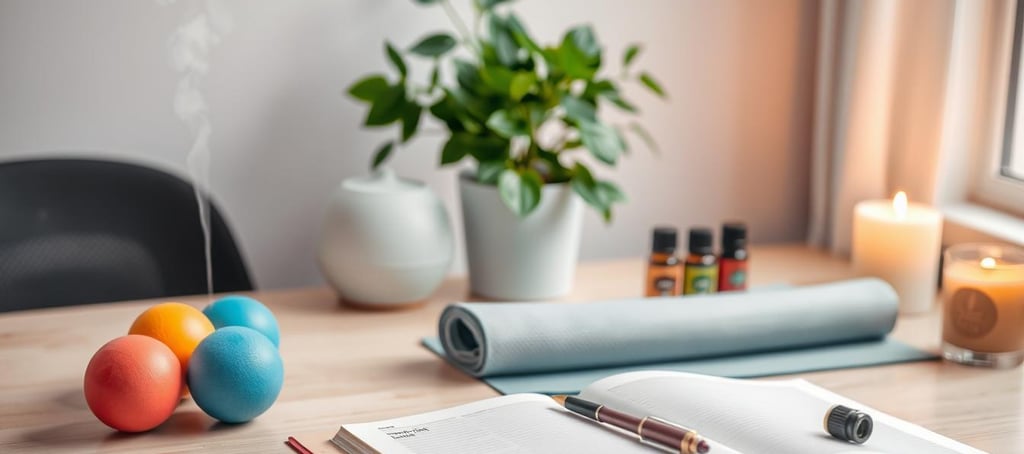10 Simple Stress Management Techniques You Can Use Today
Take control of your stress with our insightful stress management article.
STRESS MANAGEMENT
ActiveVitaLife
2/21/20259 min read
Key Takeaways
Stress management techniques can improve your overall quality of life
Effective stress relief tips can reduce stress and anxiety
Coping strategies for stress can help you stay focused and productive
Relaxation techniques can improve your mental and physical health
Mastering stress management can help you maintain a balanced life
Stress management techniques can be incorporated into your daily routine
Learning stress relief tips and coping strategies for stress can have a positive impact on your life
Understanding Stress and Its Impact
Stress is a natural response to threats or pressure. It can affect us physically, emotionally, or mentally. To handle stress well, we need to know how it impacts us.
Adding relaxation techniques like deep breathing and muscle relaxation to our day can help. These methods reduce stress's negative effects.
Mindfulness, including meditation and yoga, can also lower stress and anxiety. These practices help us stay in the present. They let us forget worries about the past or future.
Exercises like walking or jogging can release "feel-good" hormones. These hormones can make us happier and less stressed.
Stress symptoms include anxiety, insomnia, and digestive issues. If not managed, chronic stress can cause serious health problems. These include heart disease, diabetes, and mental health disorders.
By focusing on stress management, we can improve our health. We can use relaxation techniques, mindfulness, and exercises to feel better.
It's key to understand stress management's importance. We should take steps to manage it. This includes setting realistic goals, taking care of ourselves, and getting support from loved ones or professionals.
By controlling our stress, we can live better lives. We become more resilient to stress.
Effective Breathing Techniques for Stress Relief
Stress can feel overwhelming, but there are simple ways to manage it. Breathing techniques are a great tool for stress relief. By using these techniques daily, we can reduce stress and feel better overall.
Deep breathing exercises calm the mind and body. This involves slow, deep breaths in through the nose and out through the mouth. It helps slow down our heart rate and promotes relaxation. The box breathing method is another technique. It involves breathing in for four counts, holding for four, exhaling for four, and holding again for four.
Deep Breathing Exercises
Deep breathing exercises can be done anywhere, anytime. Find a quiet spot to sit or lie down, and close your eyes. Take a slow, deep breath in through your nose, filling your lungs. Then, exhale slowly through your mouth. Repeat this several times, focusing on the breath.
Box Breathing Method
The box breathing method is simple yet effective. Start by breathing in for four counts, filling your lungs. Hold your breath for four counts, then exhale for four. Hold again for four counts, and repeat. This method can slow your heart rate and help you relax, making it great for stress management.
By adding these breathing techniques to our daily routine, we can manage stress better. They help reduce stress and anxiety and improve our health. With regular practice, we can learn to handle stress and live a healthier, happier life.
The Role of Physical Activity in Stress Reduction
Regular physical activity is key to reducing stress and anxiety. Exercise releases "feel-good" hormones called endorphins. Adding physical activity to our daily routine boosts our health and happiness. Using stress management resources like fitness classes or workout videos can help us start.
There are many types of exercise to try, like cardio, strength training, and flexibility exercises. Running, swimming, and cycling are good cardio options. Strength training, like weightlifting, builds muscle and lowers stress. Flexibility exercises, such as yoga, improve flexibility and balance.
Making movement a part of our day is easy. We can take a short walk during lunch or do jumping jacks during TV commercials. By following stress relief tips, like planning exercise in our daily planner, we can make it a priority. Here are some ways to add physical activity to our day:
Taking the stairs instead of the elevator
Walking or biking to work
Doing household chores, such as gardening or cleaning
By making physical activity a daily habit, we can lower stress and boost our health. Always check with a healthcare professional before starting a new exercise program.
Mindfulness and Meditation Practices
Practicing mindfulness and meditation can help manage stress. It brings calm and clarity to daily life. By adding mindfulness to their routine, people can feel less stressed and more focused.
Mindfulness helps people stay present and aware. It's done through deep breathing, guided meditation, and mindful movement. Regular practice boosts self-awareness and self-acceptance, leading to a better life.
Simple ways to add mindfulness to your day include focusing on your breath. You can also notice your senses while eating or walking. Yoga or tai chi are great too. These activities help reduce stress and bring calm, making them key to managing stress.
Introduction to Mindfulness
Mindfulness means being fully present and aware. It's about noticing your thoughts, feelings, and sensations without judgment. You can practice it through meditation, deep breathing, and mindful movement.
Guided Meditation Techniques
Guided meditation uses audio or an instructor to guide you. It's a good way to start meditating. It gives a clear structure and helps you stay focused.
Quick Mindfulness Exercises for Daily Use
Quick mindfulness exercises can be used daily to reduce stress. Try deep breathing before a meeting or notice your senses while eating. Short meditations during work breaks can also help.
Time Management Strategies to Cut Down Stress
Managing our time well is key to less stress and better health. By focusing on what's important and using our time smartly, we feel less overwhelmed. This helps us stay calm and focused, even when things get tough.
Using the Eisenhower Matrix is a great way to manage time. It helps us sort tasks into urgent vs. important ones. This way, we spend our time on what really matters. Setting achievable goals and breaking them down helps too. It makes tasks feel less daunting and boosts our productivity.
Stress-reducing activities like deep breathing and meditation are also helpful. They can be part of our daily routine to keep stress at bay.
Saying no is another important time management skill. Taking on too much can cause burnout and stress. It's vital to know when to say no and delegate tasks when needed.
By using these strategies, we can live a less stressful life. Other effective methods include:
Creating a schedule and sticking to it
Using time-blocking to focus on important tasks
Taking regular breaks to reduce burnout
By making these strategies a part of our daily life, we can manage stress better. Remember, good time management is a big part of handling stress. By prioritizing and managing our time well, we can feel less overwhelmed and more productive.
Nutrition and Its Role in Stress Management
Nutrition is key in managing stress. It gives our body the fuel it needs to handle stress. Eating well can lower stress and anxiety. But, a bad diet can make these feelings worse.
Adding healthy foods to our diet helps us manage stress better. Foods like leafy greens, berries, and nuts are full of good stuff. They help fight stress and anxiety. Also, drinking enough water is important. Even a little dehydration can make stress and anxiety worse.
Foods That Help Fight Stress
Leafy greens, such as spinach and kale
Berries, such as blueberries and strawberries
Nuts, such as almonds and walnuts
The Importance of Hydration
Drinking lots of water is good for our health. It also helps lower stress and anxiety. Try to drink at least eight glasses a day. If you're active or live in a hot place, drink more.
Supplements to Consider
Some supplements, like omega-3s and probiotics, can help with stress. But, talk to a doctor before taking them. They can help or hurt, depending on your health.
Social Support and Its Importance
Having a strong support network is key for managing stress. When we're around people who care, we feel less alone. This helps us face challenges better. By adding social activities to our daily routine, we can handle stress better and feel better overall.
Building a Strong Support Network
A support network can include friends, family, and coworkers. They offer emotional support, practical help, and a sense of belonging. To grow a strong network, we must keep in touch and thank those who support us.
Seeking Help from Friends and Family
Getting help from friends and family is easy. Just ask for someone to listen or help with chores. Being open about our struggles helps us manage stress and get the support we need. Here are some ways to ask for help:
Talk to a trusted friend or family member about what's bothering you.
Ask for help with tasks or errands.
Join a social group or club to meet new people and grow your support network.
By using these tips and asking for help when needed, we can boost our mental health. Remember, having social support is a big part of managing stress. By focusing on our relationships and asking for help, we can find effective ways to reduce stress.
Creating a Stress-Free Environment
Creating a stress-free environment is key to reducing stress and anxiety. Use apps or professional organizers to declutter and organize your space. This makes your area peaceful and helps you relax.
A calm workspace is important for being productive and focused. You can achieve this by using meditation or deep breathing.
Here are some ways to make your space stress-free:
Organize your space to cut down on clutter and help you relax.
Use apps or get help from professional organizers to keep your space tidy.
Add meditation or deep breathing to your daily routine.
By doing these things, you can make a space that's calm and helps you feel better.
Creating a stress-free environment takes time and effort. But the good news is, it's worth it. By using stress management techniques and resources, you can make a peaceful and organized space. This space will help you relax and reduce stress.
Long-Term Strategies for Managing Stress
Creating long-term plans is vital for managing stress and keeping life balanced. Building resilience helps us deal with tough times better. Adding stress management techniques like exercise, mindfulness, and social support to our daily life can greatly reduce stress.
Developing Resilience
Resilience lets us adapt and thrive when things get hard. It helps us handle stress better and stay positive, even when it's tough. This can mean using positive self-talk, setting goals, and getting support from family and friends.
Incorporating Stress Management into Daily Life
It's important to make stress management a regular part of our lives. This includes using stress relief tips like exercise, deep breathing, and enjoying hobbies. By focusing on our well-being, we can find healthy ways to cope and live a balanced life.
Evaluating and Adjusting Your Techniques
It's key to check if our stress management methods are working and make changes if needed. What works for one person might not work for another. So, it's good to try different approaches to find what works best for us. By always improving our stress management, we can keep our life healthy and balanced.
FAQ
What is stress, and why is it important to manage it?
Stress is our body's way to react to threats. It can affect us physically, emotionally, or mentally. If we don't manage stress, it can harm our health a lot. So, it's key to keep our lives balanced and healthy.
What are some common symptoms of stress?
Signs of stress include feeling anxious, trouble sleeping, and stomach issues. You might also feel tense or have trouble focusing. Spotting these signs is the first step to dealing with stress.
How can breathing techniques help manage stress?
Deep breathing and the box breathing method calm our mind and body. They help lower stress and anxiety. These methods make us breathe in a controlled way, which relaxes us.
What are the benefits of regular exercise for stress reduction?
Exercise releases happy hormones that fight stress and anxiety. You can do different exercises like running, lifting weights, or stretching. Adding these to your routine can make you feel better overall.
How can mindfulness and meditation practices help manage stress?
Mindfulness is about being in the moment and noticing our feelings without judging. Meditation and quick mindfulness exercises can lessen stress and improve focus. They also make us feel better overall.
What are some effective time management strategies for reducing stress?
Good time management means focusing on what's important and saying no when needed. Techniques like the Eisenhower Matrix help. They keep us from getting overwhelmed and stressed.
How can nutrition and hydration support stress management?
Eating foods like greens, berries, and nuts helps fight stress. They give us important nutrients. Drinking enough water is also key, as dehydration can make stress worse. Supplements like omega-3s and probiotics can also help.
Why is social support important for managing stress?
Having friends, family, and colleagues who support us is vital. They offer emotional support and help. If needed, seeking professional help like therapy can also be helpful.
How can creating a stress-free environment help reduce stress?
Keeping our spaces tidy and organized helps us relax. Apps or professional organizers can help with this. A calm environment makes it easier to manage stress.
What are some long-term strategies for managing stress?
Building resilience and using stress management techniques daily are key. Regularly checking and improving our strategies is also important. This way, we can keep stress under control and live a balanced life.
Read the Article: Proven Strategies for Effective Stress Management.
Activevitalife
Your Guide to Weight Management & Muscle Building
Contact:
Trust
contact@activevitalife.click
© 2025. All rights reserved.
Disclaimer: The information provided on this blog is for general informational and educational purposes only and should not be considered medical advice. The content is not intended to diagnose, treat, cure, or prevent any disease or health condition.









